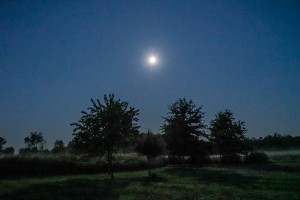My playlist regularly reflects my mood, especially which Bruce Springsteen songs I’m playing on repeat. In my darkest moments, selections from the album “Nebraska” dominate. When I am feeling energetic and joyful, I love listening and singing along to “Badlands” while picking up speed on my bike on the Gap Trail. And lately, “Dancing in the Dark” has been in heavy rotation.
“Dancing in the Dark” evokes memories of my teen years, with its opening synthesizer riff (every song in the ‘80s seemed to open with a synthesizer riff) and a music video featuring a pre-”Friends” Courteney Cox. But as I sit around getting older (“there’s a joke here somewhere and it’s on me”), the song seems to resonate most with my moments of melancholy (the John Legend version captures this well). The Boss is singing about writer’s block, the feelings that underlie that block, his yearning to get through it and his pleas for help. And that is a feeling that I have known in the past, and that I have felt recently.
The power of the brain presents many paradoxes, including that some of its functions aimed at boosting human resilience also introduce points of fragility. Difficult things are not just remembered; the physical responses we have to those difficulties are imprinted on our brains and in our bodies. Reminders of trauma elicit physical responses: muscle tension, elevated heart rate, difficulty breathing or just plain exhaustion. The psychiatrist Bessel van der Kolk writes about this in his bestselling book “The Body Keeps the Score” (and, to anyone looking for a not-so-light but nonetheless counseling and informative read, I highly recommend it). Van der Kolk not only dives into the neuroscience behind how trauma impacts both brain and body, but also shows how a range of different therapeutic approaches may help to mitigate these effects.
By every measure, the past 18 months have been traumatic for us all. In addition to the fear and confusion instilled by the pandemic, the anger and frustration generated by regular displays of racial injustice, the catastrophic natural disasters that reflect the increasing impact of climate change on our planet, political unrest and tumult resulting in tragedy all over the world, we have continued to live in a state of what feels like perpetual uncertainty.
The rituals that provide guideposts in our lives — graduations, funerals, weddings, family reunions — have been upended, rescheduled, restructured or just plain canceled. The habits we form, even around simple things (like eating in a regular spot in Peirce) can be disrupted on short notice. The plans we make about our future, even those most ambitious plans that motivate our hard work and hold out promise for great things to come, even these can feel more tenuous than ever. Rituals, habits and plans are all integral forces for my own sense of resilience, and having all three of these questioned again and again and again takes a traumatic toll.
For me, this toll often comes in the form of a mental freeze coupled with a general state of exhaustion. And here is where “Dancing in the Dark” comes in; as Springsteen sings in the opening verse:
I get up in the evening
And I ain’t got nothing to say
I come home in the morning
I go to bed feeling the same way
I ain’t nothing but tired
Man, I’m tired and bored with myself
Hey there baby, I could use just a little help.
I’m guessing I’m not alone in this state (though I may be one of the few folks on campus expressing this by screaming these lyrics). And as the Delta variant complicated our hope that widespread vaccination would restore some certainty and predictability to life, the start of the semester rocked by a campus surge in COVID, I am certain that many of us are feeling the physical and emotional impact of the past year’s trauma.
As van der Kolk describes, there are multiple approaches to how we can help our bodies and minds process and move through the sense of paralysis. For me, I have found a few things helpful:
- Exercise. Getting outside to move, in any way, is helpful. Movement can help what Amelia and Emily Nagoski (in their book “Burnout”) call “complet[ing] the stress cycle.” Even indoor physical activity relaxes muscles and can improve sleep. Getting outside is better (whether on Middle Path, on the Kokosing Gap Trail or in the BFEC), since natural settings can also have a positive relaxing effect. And, if you can move around outside with friends, that is even better still (since, for some, social interactions enhance this effect even more).
- Music. Listening to music is a true pleasure for me. Not just listening, but absorbing, ruminating, singing, dancing, organizing, deconstructing. Build a playlist that helps to express your feelings (late last night I built a playlist entirely out of versions of Prince’s “Nothing Compares 2 U,” with my favorites being Sinead O’Connor and Chris Cornell). Or build a playlist that sparks joy (I followed up the dark “Nothing Compares 2 U” mix with a September joy list, featuring Stevie Wonder’s “Signed, Sealed, Delivered,” Prince’s “Let’s Go Crazy” and of course Earth, Wind and Fire’s “September”). Dance passionately to something that makes you want to move (my choice of the moment: the Go-Go’s “We Got the Beat”).
- Friends and connections. A short text message from a friend can totally make my day — the simple reminder that I am not alone.
And that’s my weekend plan — remembering to find the sparks that restart my fire, even if I just end up dancing in the dark.
If you have a short thought on the sparks you are finding to restart your own fire, please share it here.
The Kenyon community shares how they’re restarting their fires:
“Cooking elaborate meals for friends; a long walk with the dog in Gambier; re-reading a favorite book.” — Professor Emeritus of Biology Harry Itagaki
“Watching my students dig in, help each other, and accomplish hard things together in class.” — Assistant Professor of Statistics Erin Leatherman
“Long walks by myself, learning to use the camera on my new phone to record flora and fauna.” — Jamie Gump, former member of Gambier Village Council
“I take time each morning to put down thoughts in my journal and read them at the week to help reflect on my thoughts and feelings.” — Anonymous
“Music saves me on a regular basis as well. In addition to giving myself regular reiki and aromatherapy treatments, I'm about to adopt a beautiful Doberman Greyhound. I'm naming her Vida. She is already bringing so much life back to my soul!” — Assistant Bookstore Manager Heather Petersen
“My spark is supporting my staff, customers and patrons at the Library of Congress. Hearing from former classmates and friends I’ve lost touch with over the years always helps restart my fire.” — Brandon Fitzgerald ‘06

